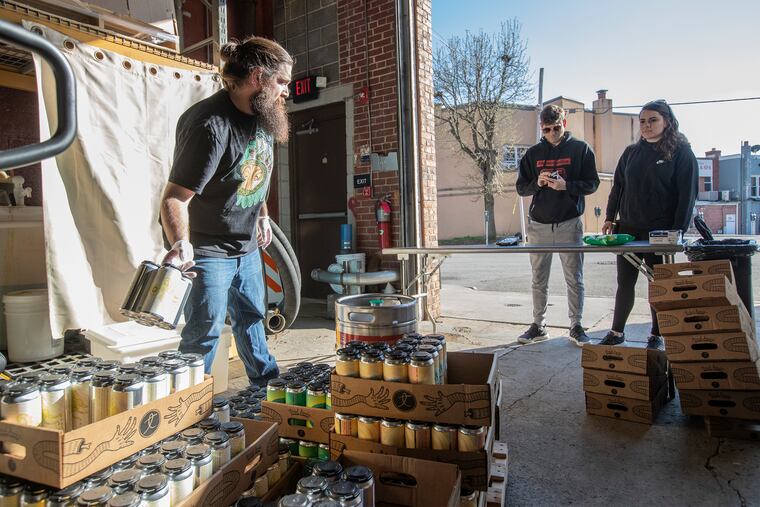Coronavirus stimulus bill includes holiday gifts to Pa. brewers, racetracks, and other local interests
The bill has several benefits, including tax breaks for alcohol and craft beer industries, racetracks, filmmakers, and other niche industries, but the president has hinted he might veto it.

The $900 billion coronavirus stimulus legislation passed by Congress includes money not just for direct payments and unemployment benefits but also for rental assistance, broadband access, and child care.
There’s also aid to small businesses and boosts to niche industries, making permanent some tax breaks for alcohol and craft beer industries, racetracks, and filmmakers. Altogether, the measure could send about $36 billion to Pennsylvanians, according to one budget forecaster — about the size of the state’s annual budget.
President Donald Trump has left the emergency measure’s fate in doubt, however, calling it a “disgrace” and urging lawmakers to increase direct payments to Americans from as much as $600 to $2,000 for those making as much as $75,000. The relief legislation was paired with a $1.4 billion annual appropriations package, so a veto could lead to a government shutdown next week.
Hundreds of thousands of Pennsylvanians are set to lose federally funded unemployment benefits on Dec. 26, according to the state. And a federal moratorium on evictions is set to expire Dec. 31, though the new relief measure would extend it another month.
“Unless something is done quickly and strongly enough, we’re gonna be in very deep trouble,” said Marc Stier, director of the Pennsylvania Budget and Policy Center, a left-leaning think tank based in Harrisburg. He estimated that the $2.2 trillion COVID-19 relief bill Congress passed in March helped keep two million Pennsylvanians from falling into poverty.
Stier estimated that the relief measure would deliver about $1 billion in rental assistance to Pennsylvanians. That’s “desperately needed,” he said.
» READ MORE: Republicans block $2,000 virus checks despite Trump demand
He also estimates that the legislation includes $2 billion for Pennsylvania public K-12 schools, $800 million for colleges and universities, $128 million to expand broadband access to low-income households, $400 million in child care aid, and increased food stamp benefits.
The relief measure also includes $15 billion for the entertainment industry, helping movie theaters, music clubs, and cultural institutions. Pennsylvania businesses would likely get about $600 million from that pot, according to Stier.
The 5,593-page bill also includes help for businesses.
Alcohol producers nationally won a permanent excise-tax cut. Several other industries — including motor sport racetracks, film producers, and tourism bureaus — got tax deduction extensions through the end of 2025.
» READ MORE: Pa. misses deadline to spend $108M in rent, mortgage relief from CARES Act
The Pennsylvania Restaurant and Lodging Association hailed the bill as “a big deal, especially for hotels and restaurants on their last legs.”
New coronavirus restrictions imposed by Gov. Tom Wolf and Mayor Jim Kenney “put a final nail in the coffin,” said spokesperson John Longstreet. “So we’re very excited” that the relief bill passed and is awaiting Trump’s signature.
The legislation expands the list of restaurants, hotels and other hospitality businesses that could borrow as much as 3.5 times average payroll under the resurrected Paycheck Protection Program. That’s higher than the 2.5 times average payroll that is the maximum loan amount for other industries.
”There’s a carve-out for restaurants and hotels with under 300 employees and multiple locations. That benefits franchisees and small chains. It’s really helpful,” Longstreet said.
Also, PPP loans could now be used to buy perishable food and cover other supplier costs, he said. The last round of PPP allowed the money to be used only for payroll and rent, and didn’t allow businesses to use loan money to buy perishable products to reopen.
» READ MORE: Congress’ relief bill brings more PPP business loans, even if you borrowed in the first round
Other Pennsylvania beneficiaries include direct marketing associations such as Visit Philadelphia, the Philadelphia Convention and Visitors Bureau and other so-called 501(c)6 organizations. Each county in Pennsylvania has its own tourism board, and those struggling organizations that were funded through county hotel taxes would now be able to apply for PPP loans as well, Longstreet said.
”Some smaller ones are looking at barely surviving, since there’s very little hotel tax revenue,” he said. “This gives them an opportunity to bring employees back, promoting travel and tourism.”
Help for craft brewers
Bill Covaleski, founder of Victory Brewing in Downingtown, Pa., was glad to see the relief package offered tax breaks for smaller beer brewers.
It made permanent a tax benefit that took effect in 2018, he said, keeping the federal excise tax at $3.50 a barrel for brewers that produce less than 60,000 barrels a year. The rate increases to $7.50 a barrel when the business exceeds 60,000 barrels annually.
Known as the Craft Beverage Modernization and Tax Reform Act (CBMTRA), the bill was tucked into the larger relief package.
The lower rate will expire at the end of the year, absent the legislation. “If I were a small Pennsylvania brewery, without this extension, they would enter 2021 paying double the excise tax,” Covaleski said.
Boston Beer in the Lehigh Valley, Victory, and Yuengling all produce in Pennsylvania, making the commonwealth the No. 2 producer of craft beer in the country, he said.
The freeze on the excise tax “is a godsend,” said Steve Grasse, founder of Quaker City Mercantile distillery in Center City.
”It is precisely what our growing industry needs,” he said. “This will help keep many craft brewers and craft distillers alive and thriving. The [tax] deduction of the ‘three martini lunch’ will also help quite a lot,” he said of the corporate meal tax break.
Covaleski also sits on the board of the Chester County Conference and Visitors Bureau (CCCVB), and said an expansion of borrowing for direct marketing organizations such as the county tourism offices is definitely needed.
“They haven’t been able to access funding,” he said. “The CCCVB is most likely to apply.”